|
|
|
Sort Order |
|
|
|
Items / Page
|
|
|
|
|
|
|
| Srl | Item |
| 1 |
ID:
179933
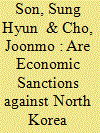

|
|
|
|
|
| Summary/Abstract |
This study analyzes the effects of the economic sanctions imposed against North Korea since 2016 on the economic well-being of North Korean cities. As a proxy for economic well-being, we use nighttime light (NTL), which is estimated from 1992 to 2019 through an inter-calibration process for DMSP/OLS and SNPP/VIIRS. We found that the total NTL growth rate of 25 major cities decreased after 2016, but that NTL itself was still getting brighter until 2009. The declines in the NTL growth rates of Pyongyang, the capital city, as well as cities bordering China and self-regenerating cities, were relatively slight. By contrast, the declines in the NTL growth rates of coal-mining cities and inland cities without sufficient production bases were greater than those in other cities. Cities in regions relying on coal-mining have traditionally accounted for a large portion of North Korea’s exports, and since they are heavily affected by sanctions, coal mining could become a vulnerable sector, which would threaten North Korea’s economic well-being.
|
|
|
|
|
|
|
|
|
|
|
|
|
|
|
|
| 2 |
ID:
169153
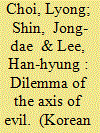

|
|
|
|
|
| Summary/Abstract |
This research examines the international relations between North Korea (the
Democratic People’s Republic of Korea or DPRK) and Iran in the context of their
shared perception of a threat from the United States. We discuss the conventional
idea of the international relationship—the enemy of my enemy is my ally—to
explain Pyongyang–Tehran relations, evaluate its past and current relations, and
offer policy suggestions for the recent denuclearization approach toward North
Korea and Iran. Using newly discovered archival resources and political records, we
challenge the conventional idea that the two states share the same threat perception
in a consistent manner and suggest the level of their military cooperation changes
depending on the approach from Washington and the international community. This
research provides a more exact picture of the international relations North Korea
and Iran since the 1980s and of the link between their shared threat perception and
denuclearization debates.
|
|
|
|
|
|
|
|
|
|
|
|
|
|
|
|
| 3 |
ID:
153578
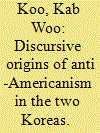

|
|
|
|
|
| Summary/Abstract |
In this article I explore the discursive origins of anti-Americanism or anti-American sentiments in the two Koreas, where the status of postcolonial states was pursued in different ways. I compare two early examples of stories that embodied anti-Americanism, based on discourse analysis in literary criticism: Jackals, written by the North Korean novelist Han Sorya, and Land of Excrement, written by the South Korean novelist Nam Jung-hyun. I emphasize the differences between the two anti-Americanisms in terms of their respective discursive origins. Land of Excrement was reprinted in a North Korean Communist Party bulletin without the author's permission, and he was arrested in 1965. The incident symbolizes the antagonistic relations of the two Koreas as well as the implicit and unofficial linkage between South Korean civil society and the North Korean state.
|
|
|
|
|
|
|
|
|
|
|
|
|
|
|
|
| 4 |
ID:
181691
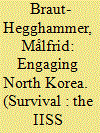

|
|
|
|
|
| Summary/Abstract |
North Korea and the United States are edging towards re-engagement. They agree in principle on pursuing a phased approach to negotiations but disagree on how to begin and what the end goal should be. A warming-up phase can allow states to informally explore specific options for future engagement. By participating in activities such as table-top exercises, simulations and familiarisation visits, the participants develop a more specific understanding of the purpose and format of the activities and verification measures that might follow a formal agreement. This process engages the technical and military bureaucracies at an early stage. It provides a private setting to raise concerns and address misunderstandings. It is an opportunity to demonstrate goodwill and interest in engagement that does not require concessions. Drawing on past examples, this article suggests specific options for a warming-up phase involving North Korea and the United States.
|
|
|
|
|
|
|
|
|
|
|
|
|
|
|
|
| 5 |
ID:
153579
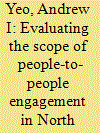

|
|
|
|
|
| Summary/Abstract |
Although North Korea remains one of the most isolated countries in the world, hundreds of foreign actors continue to work quietly inside the country. What is the size and scope of foreign engagement inside the Democratic People's Republic of Korea (DPRK)? What types of activities do nongovernmental organizations, businesses, and other private actors conduct? What has been the experience and impact of those working inside the DPRK? Relying on an original data set and interviews with sixteen organizational field representatives and staff members with experience working inside the DPRK, I uncover basic trends related to people-to-people engagement in areas such as humanitarian relief, development assistance, educational assistance, professional training, and business interaction. Although impressive growth has taken place in foreign engagement in the DPRK, its potential impact remains unclear due to ongoing internal and external constraints.
|
|
|
|
|
|
|
|
|
|
|
|
|
|
|
|
| 6 |
ID:
147864
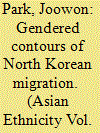

|
|
|
|
|
| Summary/Abstract |
This article examines the gendered and sexualized contours of North Korean experiences in South Korea at a time when nearly 70% of the North Korean emigrants are women. South Korean television shows – e.g. reality programs – and marriage matchmaking organizations seek to portray North Korean women in a ‘positive’ way to the South Korean public, although, as this article will illustrate, these representations are of a very particular, sexualized kind. These representations are sometimes negative, and there is stigma attached to North Korean women, in which South Koreans assume, for example, that they are victims of human trafficking or that they have had relations with Chinese men during their migration. Furthermore, poor nutrition and other forms of structural violence in North Korea have molded North Korean bodies; there are often physical disparities between North and South Koreans. In South Korean society where short height is viewed as undesirable and where idealized, surgical notions of beauty dominate, the violence of gendered phenotypical normalization mark North Korean bodies as smaller, foreign, and strange. Based on ethnographic research in South Korea, this article argues that these gendered contours of North Korean migration amount to a different sort of structural violence in South Korea.
|
|
|
|
|
|
|
|
|
|
|
|
|
|
|
|
| 7 |
ID:
147860
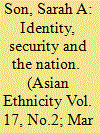

|
|
|
|
|
| Summary/Abstract |
From the Cold War era of the ‘veteran heroes’ to the present view of escaped North Koreans in terms more akin to ‘refugees’ and sometimes even just ‘migrants’, perceptions of North Korean defectors in South Korea have changed as swiftly as the number and origins of Northerners entering the South have expanded. At the same time, government policy for these ethnic ‘brethren’ has evolved considerably, particularly as South Korea has seen fundamental shifts in its independent identity, with important repercussions for the way its citizens view themselves as a collective. This article explores some of the key influences behind changes to policy and perceptions regarding North Korean people in South Korea over the period from 1997 to 2012, by applying international relations theory on national identity and its role in policy formation and change through the need to secure different parameters within that identity.
|
|
|
|
|
|
|
|
|
|
|
|
|
|
|
|
| 8 |
ID:
156333
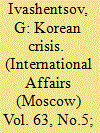

|
|
|
|
|
| Summary/Abstract |
THE YEAR 2017 has brought an aggravation of the North Korean nuclear problem. Donald Trump's assumption of office as U.S. president coincided in time with a new stage of the North Korean nuclear missile program. Kim Jong-il, the deceased father of current North Korean leader Kim Jong-un, apparently had assumed that the hypothetical possibility of retaliatory nuclear strikes against the United States and its allies was a sufficient guarantee of North Korea's security and so was quite satisfied with his country's relatively small nuclear deterrence arsenal - just about a dozen warheads - and didn't worry too much about means of their delivery. Kim Jong-un has gone further. He has ordered making more nuclear warheads and effective delivery means - intercontinental ballistic missiles (ICBMs) and submarine-launched ballistic missiles (SLBMs). This essentially means that North Korea aspires to become a full-scale nuclear power with the potential to survive a nuclear attack and inflict unacceptable damage on its adversary, the United States.
|
|
|
|
|
|
|
|
|
|
|
|
|
|
|
|
| 9 |
ID:
181689


|
|
|
|
|
| Summary/Abstract |
The emerging consensus in the United States is that the real US objective in talks with North Korea should no longer be its denuclearisation. The superficially sensible conventional wisdom underlying this position is that Pyongyang learned from America’s adventures in Iraq and Libya that only a nuclear deterrent precludes regime change, and that it would not relinquish something it worked so hard to attain at the negotiating table. These assumptions may still be wrong, and it would be a mistake to pre-emptively surrender an essential objective, especially given that doing so would incentivise Japan and South Korea to acquire nuclear weapons. Washington should carefully explore the possibility that the North would give up its nuclear weapons if it could achieve political, economic and diplomatic integration into the international community and true normalisation of its relations with the US, and prepare for an arduous negotiating process.
|
|
|
|
|
|
|
|
|
|
|
|
|
|
|
|
| 10 |
ID:
154651
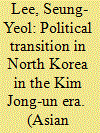

|
|
|
|
|
| Summary/Abstract |
North Korea has already begun the process of transition, the patterns of which will be determined by the elites' choice. System transition in North Korea may unfold in one of two ways: gradual transition, with the maintenance of the Suryong (supreme leader) system of communist power and acceptance of the market economy for the well-being of the people; or radical transition accompanied by sudden political change, which may lead to conflict between competitive elite groups before Kim Jong-un has time to solidify his hold on leadership. Which path will North Korea follow? In the era of Kim Jong-un, everything depends on the competition between the party elite and military elite.
|
|
|
|
|
|
|
|
|
|
|
|
|
|
|
|
| 11 |
ID:
147396
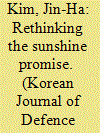

|
|
|
|
|
| Summary/Abstract |
North Korea conducted its fourth nuclear test in January 2016. It seemed to nullify Sunshine Policy, the policy idea that South Korea’s economic assistance can induce North Korea’s post-communist reform and opening, and, in turn, promote interKorean peace. The primary purpose of this article is to identify the structural causes of the failure of these inducement policies, while seeking potential remedies. The argument is that South Korean assistance policies have not managed to effectively accomplish the intended outcomes because of the patrimonial domination of North Korean rent-seeking elites and the under-provision of policy harmonization among engaged donors. First, the patrimonial domination, substantially free of institutions of accountability, matters. Second, the lack of international harmonization among engaged donors’ policy goals decreases aid effectiveness, which seems to worsen the problem of politicized aid. In the event that North Korea changes its policy directions to meet the international demands of denuclearization, this article suggests the institutionalization of a multinational consortium to promote policy harmonization among engaged donors and to lower the structural impediments raised by the North Korean ancien régime as well.
|
|
|
|
|
|
|
|
|
|
|
|
|
|
|
|
| 12 |
ID:
149017
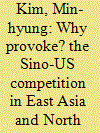

|
|
|
|
|
| Summary/Abstract |
This article seeks to make sense of North Korean provocations in light of the Sino-US strategic competition in post-Cold War East Asia, where such variables as China’s rise, US’s pivot to Asia, and growing Sino-ROK economic ties are driving the strategic choices of major states in the region. The article examines the main motivations behind Pyongyang’s provocations since the end of the Cold War, discusses their implications for the Sino-US strategic competition in East Asia, and offers predictions about the future of North Korean provocations. The central thesis of the article is that Pyongyang has exploited the Sino-US strategic competition in East Asia for its regime survival. By raising North Korea’s strategic value to China, the intensifying Sino-US competition allows Pyongyang to continue provocations, regardless of Beijing’s explicit opposition.
|
|
|
|
|
|
|
|
|
|
|
|
|
|
|
|
|
|
|
|
|